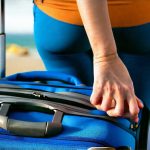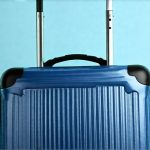Traveling should be an enjoyable experience, filled with discovery and relaxation. However, for many individuals dealing with chronic conditions – whether it’s sensitivities to changes in routine, food intolerances, motion sickness, or simply anxiety about the unknown – travel days can quickly devolve into a stressful ordeal marked by symptom flare-ups. The challenge isn’t necessarily avoiding travel altogether, but rather learning how to proactively manage those potentially triggering periods and minimize disruption to well-being. It’s about shifting from reactive coping mechanisms to preventative strategies that empower travelers to take control of their experience.
The key to successful travel management lies in understanding your personal triggers and vulnerabilities. What specifically causes you distress during travel? Is it the change in diet, sleep patterns, environment, or perhaps the stress of navigating airports and unfamiliar surroundings? Identifying these factors is the crucial first step toward building a tailored plan that prioritizes comfort and minimizes potential symptom exacerbation. This isn’t about eliminating all risks—that’s often impossible—but rather about mitigating them to create a more positive and sustainable travel experience. If you struggle with frequent urination while traveling, learning how to stay hydrated without triggering urgency can be very helpful.
Pre-Trip Preparation: Setting the Stage for Success
A significant portion of managing travel days effectively happens before you even leave home. Proactive preparation is arguably the most powerful tool in your arsenal, allowing you to anticipate potential issues and implement strategies to address them. This involves more than just packing; it’s about creating a sense of control and minimizing uncertainty. Start by carefully planning your itinerary, considering factors like travel duration, layovers, and accommodation options – all with your sensitivities in mind. Researching local resources, such as allergy-friendly restaurants or accessible transportation options, can also alleviate anxiety and provide peace of mind.
Don’t underestimate the power of a detailed packing list tailored to your needs. This should include not only essential medications but also comfort items that help you feel secure, like noise-canceling headphones, a travel pillow, or familiar snacks. If you have dietary restrictions, consider bringing shelf-stable alternatives to ensure you always have something safe and nourishing available. Finally, inform relevant parties – airlines, hotels, tour operators – about any specific requirements or accommodations you may need, allowing them time to prepare and assist you accordingly. Preparing your bladder for active travel days is also a good idea if you have concerns.
Consider a “practice run” before your trip. If anxiety is a concern, simulate aspects of travel—packing, going through airport security (if possible), even watching videos of your destination—to desensitize yourself and build confidence. This can be particularly helpful for individuals with phobias or generalized anxiety disorder. It’s about transforming the unknown into something more familiar and manageable.
Navigating Travel Day Challenges: Strategies in Action
Once you’re on your way, travel days often present a unique set of challenges. Disruptions to routine are common, and unexpected events can quickly throw even the most carefully laid plans off course. The key here is flexibility and adaptability. Maintaining some control over your immediate environment can be immensely helpful. For example, if you’re sensitive to noise or light, utilize earplugs or an eye mask during travel. Staying hydrated is also crucial, as dehydration can exacerbate many symptoms.
Prioritize self-care throughout the journey. This might involve taking short breaks to practice mindfulness exercises, stretching, or simply listening to calming music. Avoid overexertion and listen to your body’s signals. If you’re feeling overwhelmed, don’t hesitate to ask for assistance from airline staff or travel companions. Remember, it’s okay to modify your plans if needed—a slightly altered itinerary is preferable to a full-blown symptom flare-up.
Furthermore, be mindful of food and beverage choices. Stick to familiar foods whenever possible, and avoid anything that you know triggers your sensitivities. Pack healthy snacks to prevent hunger pangs and the temptation to indulge in less desirable options. Finally, remember that rest is paramount. Even short naps can significantly improve energy levels and resilience during travel. Understanding how to cook with beans without triggering a flare when you are on the road can also make things easier.
Minimizing Motion Sickness & Discomfort
Motion sickness affects many travelers, but there are several strategies you can employ to minimize its impact. – Choose a seat with minimal motion: A forward-facing seat in the middle of the plane or car generally experiences less movement than seats over the wings or at the back. – Focus on a fixed point: Looking out the window and focusing on the horizon can help your brain reconcile the conflicting signals it receives from your inner ear and eyes. – Avoid reading or looking at screens: These activities can worsen motion sickness, as they require your eyes to focus on something stationary while your body is in motion. – Consider over-the-counter remedies: Ginger capsules, acupressure wristbands, and anti-nausea medications (consult with a healthcare professional before taking any medication) can provide relief.
Managing Dietary Restrictions on the Go
Traveling with dietary restrictions requires careful planning and preparation. Before your trip, research restaurants and grocery stores at your destination that cater to your needs. – Pack essential snacks: This ensures you always have safe and nourishing options available, especially during travel days when choices may be limited. – Communicate clearly: Inform airlines, hotels, and restaurants about your dietary restrictions when making reservations or placing orders. – Be prepared for unexpected situations: Carry a translation card explaining your dietary needs in the local language if traveling internationally.
Reducing Stress & Anxiety During Travel
Travel can be inherently stressful, but there are several techniques you can use to manage anxiety levels. – Practice deep breathing exercises: Slow, deliberate breaths can help calm your nervous system and reduce feelings of panic. – Utilize mindfulness meditation: Focusing on the present moment can help quiet racing thoughts and promote relaxation. – Create a calming playlist: Listening to soothing music can provide a sense of comfort and distraction. – Limit exposure to stressful stimuli: Avoid news updates or social media if they tend to increase your anxiety.





















